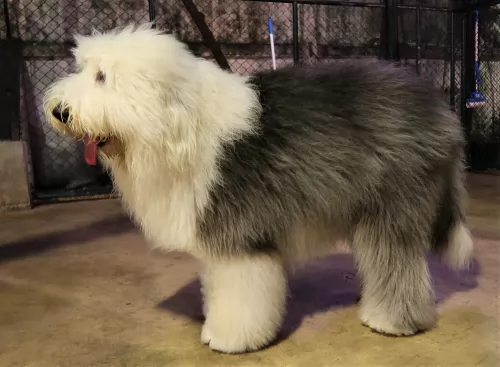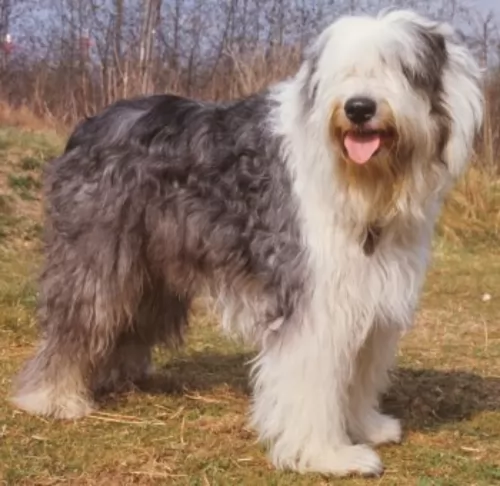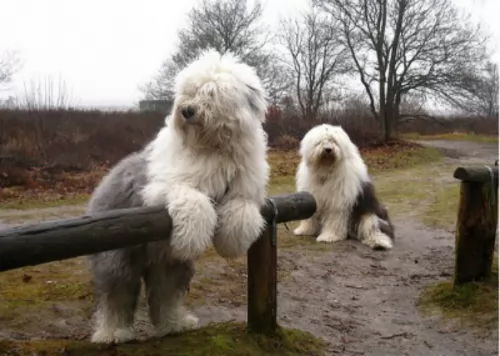 Petzlover
Petzlover French Brittany is originated from France but Old English Sheepdog is originated from United Kingdom. French Brittany may grow 40 cm / 15 inches shorter than Old English Sheepdog. French Brittany may weigh 25 kg / 55 pounds lesser than Old English Sheepdog. Both French Brittany and Old English Sheepdog has almost same life span. Both French Brittany and Old English Sheepdog has almost same litter size. French Brittany requires Low Maintenance. But Old English Sheepdog requires Moderate Maintenance
French Brittany is originated from France but Old English Sheepdog is originated from United Kingdom. French Brittany may grow 40 cm / 15 inches shorter than Old English Sheepdog. French Brittany may weigh 25 kg / 55 pounds lesser than Old English Sheepdog. Both French Brittany and Old English Sheepdog has almost same life span. Both French Brittany and Old English Sheepdog has almost same litter size. French Brittany requires Low Maintenance. But Old English Sheepdog requires Moderate Maintenance
 Brittanys are the product of France, actually developed in the Brittany Province. They are gun dogs designed to hunt birds. Referred to more often than not as a Spaniel their method of working is much more in line with the setters and pointers. They are believed to be developed somewhere between the 17th and 19th centuries, but not recognized until the 20th century. Orange and white dogs were portrayed on 17th century tapestries, hunting and retrieving. In 1850 the Reverend Davies wrote the first record of Brittanys that was verifiable.
Brittanys are the product of France, actually developed in the Brittany Province. They are gun dogs designed to hunt birds. Referred to more often than not as a Spaniel their method of working is much more in line with the setters and pointers. They are believed to be developed somewhere between the 17th and 19th centuries, but not recognized until the 20th century. Orange and white dogs were portrayed on 17th century tapestries, hunting and retrieving. In 1850 the Reverend Davies wrote the first record of Brittanys that was verifiable.
The Brittany was recognized for the first time in 1907 as their own breed even though they participated in the Paris Dog Show in 1900. Once recognized the standards were written as well. It was not until 1931 that the breed was recognized in America and 1934 before the American Kennel Club approved them. Until 1982 they were known as the French Brittany Spaniel. The Spaniel was dropped in ’82. In the United Kingdom the Brittany is known as an HPR (Hunt, Point and Retrieve) breed and they do so with both birds and small game such as hares. The Brittany’s have more dual champions than any other American Kennel Club Sporting Breed in both Confirmation and Field Trials.
There are some differences between the current day French Brittany and the “American Brittany”. They are the same breed but different sub-sets and there are differences that can be noted between the two. The French Brittany is smaller than the newer American version and works closer to the hunter and the guns, while the American Brittany runs ahead of the hunter quite often. Some breeders however don’t consider these differences to be sub-sets and believe that the American breeders should accept the French standards reflecting the origin of the breed.
 The origin of the Old English Sheepdog is unclear as records weren’t kept. However there are some aspects that suggest the dog originated in the 19th century and that the Scottish Bearded Collie had a significant part in the development of this dog which hails from England.
The origin of the Old English Sheepdog is unclear as records weren’t kept. However there are some aspects that suggest the dog originated in the 19th century and that the Scottish Bearded Collie had a significant part in the development of this dog which hails from England.
It is also believed that the Russian Owtchar was involved in the development of the Old English Sheepdog. The dog was recognized by the American Kennel Club in 1888. In 1904, the Old English Sheepdog Club of America was also founded.
The shape of the dog has changed very little over the years and it was in the 1880s that the dog was exported to the United States.
 The French Brittany is an energetic, compact, solid, athletic dog. They have average size heads, intelligent expressions, floppy ears, and a long, elastic and free gait. Most Brittanys are born with short tails but if not, they are docked outside the United Kingdom. Docking is illegal in the United Kingdom so those Brittanys might have a long tail.
The French Brittany is an energetic, compact, solid, athletic dog. They have average size heads, intelligent expressions, floppy ears, and a long, elastic and free gait. Most Brittanys are born with short tails but if not, they are docked outside the United Kingdom. Docking is illegal in the United Kingdom so those Brittanys might have a long tail.
Their coats are orange roan, orange and white and liver roan. A tricoat of orange, liver and white is allowed within a specific placement of the three colors.
 The Old English Sheepdog is a large dog standing at between 50 and 60cm and weighing between 27 and 45kg.
The Old English Sheepdog is a large dog standing at between 50 and 60cm and weighing between 27 and 45kg.
He is muscular with a broad bottom and hip area. The head is also large and the small ears are carried flat. The tail has always been docked, giving the dog a large panda-bear look to him, but these days the tail is often left long, and the dog loses that square compact look.
When the tail is left long it is well feathered. The coat can become fairly long and is quite harsh and wavy to straight. The coat is essentially grey with white hair over the head area. The puppies are born with their hair being black and white, and later on the traditional grey coloring comes in.
What is quite interesting with this dog is that it stands lower at the shoulder than at the loins, so just like a Panda bear, he also lopes or walks in a bear-like fashion.
The Old English Sheepdog isn’t an aggressive dog. He is social, intelligent and entertaining for his human family, whom he loves to spend time with.
He is an energetic dog too and he would prefer a country setting where there are large fields to run in as opposed to living on a tiny property in the city. He is an adaptable dog though, and will slot into life in the city or suburbs, so long as he is well exercised.
Train him and socialize him and he will become an obedient, amicable pet to have around.
Dual champions in Field Trials and Confirmation. They both point and retrieve.
They are not as adaptable as some hunting breeds. They are very active and need space both indoors and out. They are not recommended for life in apartments in the city. A rural environment is best. They do not adapt well to the damp and cold weather.
They are very intelligent and have very high learning ability.
 The Old English Sheepdog is the ideal dog for a family pet. They love spending time with their human family and are affectionate and loyal, getting on well with children as well as other pets.
The Old English Sheepdog is the ideal dog for a family pet. They love spending time with their human family and are affectionate and loyal, getting on well with children as well as other pets.
From the time he is a puppy, you can see that he is fun-loving and easy going while also being intelligent. He is also a guardian and wants to protect his human family.
Provide him with the opportunity to get out into the country sometimes if you don’t live on a farm because he is essentially a farm dog. He used to be a herding dog and likes to be busy. Treat him well and have him trained and socialized and he’ll make you a superb pet.
 Generally, a hardy breed that is mostly healthy, the Brittany in France usually lives on average 12 years 6 months. In the UK the average if 12 years and 11 months and many dogs living to be 14 or 15. Some of the health issues that might pop up for the Brittany include:
Generally, a hardy breed that is mostly healthy, the Brittany in France usually lives on average 12 years 6 months. In the UK the average if 12 years and 11 months and many dogs living to be 14 or 15. Some of the health issues that might pop up for the Brittany include:
 It is estimated that the beautiful Old English Sheepdog can live to be about 10, 11 or 12 years of age if he is looked after well. Just like with other dog breeds though, this particular dog is also prone to some of the common dog diseases there are.
It is estimated that the beautiful Old English Sheepdog can live to be about 10, 11 or 12 years of age if he is looked after well. Just like with other dog breeds though, this particular dog is also prone to some of the common dog diseases there are.
Some of these diseases include hip dysplasia, diabetes, eye diseases and deafness along with some skin problems.
As a chronic disease, Diabetes can affect dogs as well as other animals and humans. Diabetes in dogs can’t be cured but it can be managed, with Diabetes Mellitus being the kind of diabetes most seen in dogs. Whatever kind of diabetes your pet has, the negative effects remain the same.
It can be devastating when your dog has been with you for about 10 years, to discover that he has cancer. Of course, cancer is the leading cause of death found in dogs older than the age of 10.
Many cancers are curable if you catch them early. Malignant lymphoma is a common cancer with dogs but there are other cancers too. The warning signs of cancer in dogs are much the same as what you get with humans. You’ll discover a lump or even an injury that won’t heal. There could also be abnormal bleeding.
There are many different kinds of skin problems seen in dogs, some of which are more common than others. You’ll notice your dog licking a part of the body so that the hair disappears and the skin becomes exposed.
There are skin problems started because of inadequate diet and lack of nutrition. There are plenty of commercially manufactured pet foods that don’t have the right amount of vitamins and minerals your pet needs. Always buy a good quality one to fight these very aggravating skin allergies. A vet may give hydrocortisone products but many dog owners these days try to treat their dogs with natural products.
 Feed puppies a high quality puppy food designed for medium sized dogs. Give about one to one and a half cups per day in 2-3 meals.
Feed puppies a high quality puppy food designed for medium sized dogs. Give about one to one and a half cups per day in 2-3 meals.
For the adult French Brittany feed a high quality adult dry food designed for medium sized dogs. Give about two cups per day in 2 meals.
Excellent vision and scent
The French Brittany is an active and enthusiastic bird dog that loves to exercise. They have the stamina and drive that goes with an efficient and successful hunting dog. They need daily exercise, regular walks and excel at field trials and confirmation. They are also good at lure chase, flyball, rally and obedience.
 Food allergies are caused by your dog eating food with ‘bad’ ingredients which don’t agree with him. Make sure your pet has a wholesome diet.
Food allergies are caused by your dog eating food with ‘bad’ ingredients which don’t agree with him. Make sure your pet has a wholesome diet.
Invest in the very best quality commercially manufactured food. Home-made food is always a wonderful treat for any dog but it needs to be kept simple. No exotic, spicy foods and no suddenly changing your pet’s diet.
Simple, nutritional boiled chicken, brown rice or pasta and vegetables such as sweet potato, carrots and spinach added into his kibble as a treat will do wonders for your pet and he will thank you for keeping his meals tasty and simple. A little bit of raw meat added in occasionally can also do him the world of good. Fresh, cool water must always be available.
The Old English Sheepdog is quite a high maintenance dog, what with that long hair and all, and some owners of this dog prefer to take him to the parlor to have the hair sheared and wash, otherwise it could become a mammoth task for a dog owner.
If you opt to keep the hair long, you may end up having to be constantly brushing your pet’s coat to prevent it tangling. Not only that, if you live in a hot area, cutting the hair can help towards keeping the dog cool.
The ears of your dog should be checked regularly for infection as well as the eyes, and keep the nails clipped as well.